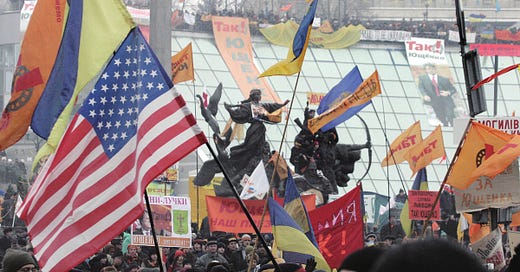The Collective West is pushing Georgia to open a second front against Russia through Colour revolution 2.0
The recent demonstrations in the Georgian Capital Tbilisi against the recently passed controversial foreign agent bill signals the West's plan to install the anti-Russia government in Georgia.
The recent protest in Georgia by pro-west groups against the Foreign Agent bill, which was passed by the Georgian parliament a week ago, shows that maidan 2.0 is about to happen in Georgia. Georgia, a former Soviet State, is one of the least Russophobic countries in the post-Soviet space compared to other states in the Baltic region. Since the beginning of the Russian Special Military operation in Ukraine, Western countries have been pressuring the Dream party-led government in Tbilisi to condemn the Russian invasion and join the western proxy war in Ukraine against Russia.
The people are still out in the streets in the Georgian Capital despite the government bowing to their initial demand, which clearly signifies that the West has plans for another Kyiv-style maidan in Georgia. Since the Rose Revolution in 2003, Georgia’s political fate has oscillated between the West and Russia. Georgia, under its former pro-west leader Mikhail Saakashvili, is currently in prison on the charges of abusing power during his rule.
For months, Western officials have been talking about the opening of a possible Second Front against Russia via Georgia, which was declined by the incumbent government in Georgia. Due to the Georgian government's constant refusal to condemn the war in Ukraine and joining the Western bloc in its proxy war against Russia, Georgia became the soft target for the West.
Weeks ago, the Georgian parliament passed a foreign agent bill citing to counter foreign influence on Georgian domestic affairs. Soon after its adoption, Western leaders ruled out the Foreign Agent bill as an attack on so-called Georgian democracy by declaring it a Russian-style purge of democratic elements. As a result of the condemnation from the EU and the U.S., Western-inspired civil society and pro-western opposition political groups took to the streets against the bill. In the last two weeks, the Georgian capital city saw the largest demonstration of its own kind since the Rose Revolution in 2003.


According to media reports, more than 10,000 people participated in ongoing demonstrations, which forced the Dream Party government to revoke the legislation but did not calm the streets. The people are still out in the streets in the Georgian Capital despite the government bowing to their initial demand, which clearly signifies that the West has plans for another Kyiv-style maidan in Georgia. Since the Rose Revolution in 2003, Georgia’s political fate has oscillated between the West and Russia. Georgia, under its former pro-west leader Mikhail Saakashvili, is currently in prison on the charges of abusing power during his rule.
The foreign agent bill became an excuse for the West to overthrow the pro-Russian government in Georgia through Maidan-style public pressure on the streets. The ongoing situation in Georgia clearly demonstrates how Western-inspired political opposition is attempting to fill the void by blackmailing the government with violent protests. Every protester on the streets of Tbilisi is holding a signboard written on it “ No to Russia” weaving the U.S., Ukrainian, and EU flags that clearly demonstrates the hidden agenda behind the protests.
The Foreign Agent bill was an independent decision of the Georgian parliament, which had nothing to do with Russia. One can easily smell the backdrop's intentions among Russophobic protestors, who are attempting to divert the blame on Russia to please their Western backers. One should not forget that the United States adopted the same kind of bill decades ago known as The Foreign Agents Registration Act (FARA) and certainly passed by many other countries in mainland Europe too.

Therefore, the question is why the West opposes the same kind of independent legislation in other countries, such as Georgia, where both democratic and parliamentary institutions are functional. Why the protestors call it a Russian bill but not an American one certainly shows how the West is again meddling in the affairs of post-Soviet space with an excuse of democracy and so-called liberal values. To further understand the root cause of the ongoing turmoil in Georgia, one should examine geopolitical transitions in the post-Soviet space after the disintegration of the Soviet Union.
In 2003, Georgia became the first major theater of the color revolution, often known as the Rose Revolution, that overthrew the Russian-friendly regime of Eduard Shevardnadze, who was then succeeded by a pro-Western politician and one of the frontline leaders of the Rose Revolution Mikhail Saakashvili.
Since the fall of the Soviet Union, the post-Soviet space of the former USSR became a new geopolitical terra firma for the collective West to encircle and weaken the Russian Federation. Since then, the Russian state has been experiencing a new geopolitical turf in the form of NATO expansion through color revolutions in the Post-Soviet Space. Despite guarantees concerning NATO expansion during the disintegration of the USSR, Western countries, especially the United States, violated the pact with Russia by allowing the expansion Eastwards starting in 1996. Due to the financial and economic turmoil, weak Russia under Boris Yeltsin was unable to resist geopolitical transitions in the Post-Soviet Space.
NATO, as a security bloc, was established in 1949 to defend the Western bloc against communist threats from the Soviet Union. There is no justifiable argument for its existence as the largest security bloc thousands of miles away from the borders of the United States. However, the United States justified its existence with the excuse of being a defense bloc to protect the interests of the U.S. in Europe and to ensure European security.
However, there were no initial plans to expand it near Russian borders, but the neo-cons and neo-liberal elites in Washington saw weakened Russia as an opportunity to expand U.S. interests in the Russian sphere of influence by dragging the post-Soviet countries into the NATO bloc. Russian fears about the threat of NATO eastward expansion became vivid when the U.S. launched a NATO-led bombardment of Belgrade in 1999 on the pretext of ending the Civil War. This was the first time since its inception in 1949 when NATO bombed a sovereign country; hence, the offensiveness of NATO in the periphery of Russia raised eyebrows among the security and political elites in Moscow.
Since then, Russian security and political elites have become concerned about NATO’s expansion eastwards and have begun warning the west about Russia’s security concerns. When Vladimir Putin ascended as president of Russia in 2000, the political landscape began to shift in Russia. Putin reiterated and reminded the west about the west’s promise not to expand NATO even an inch toward the Russian borders. However, this promise was broken when turbulent geopolitical events began taking place in the post-Soviet space after 2002. In 2003, Georgia became the first major theater of the color revolution, often known as the Rose Revolution, that overthrew the Russian-friendly regime of Eduard Shevardnadze, who was then succeeded by a pro-Western politician and one of the frontline leaders of the Rose Revolution Mikhail Saakashvili.
The Georgian Dream Party was founded by the famous Georgian Billionaire, politician, and Philanthropist Bidzina Ivanishvili in 2012 to build a sound opposition against the pro-western-led government of Mikhail Saakashvili. His party wins a majority of the seats in 2012 that allowed him to form a pro-Russian-leaning government in Georgia after almost after a decade.
Under Saakashvili, anti-Russian politics and policies became the mainstream function of the government, and his government attempted to drift Georgia away from the Russian sphere of influence with his plans to join the EU, which did not happen until this day. His hawkish anti-Russian policy finally led to a major standoff with Russia in 2008, when Russia launched a limited war and created two autonomous republics in the South: Abkhazia and South Ossetia, which are mainly Russian-populated regions.


The breakaway of the two republics further heightened the turbulent relationship between the two neighbors. The West blamed Russia for the war, but in reality, it was the pro-western regime of Saakashvili, which provoked Russia by launching a military operation against South Ossetian separatists that led to Russian Military intervention. Since then, Georgia has become a major security concern for Russia, and the relationship remained turbulent until the victory of the Pro-Russian Georgian Dream party in the 2012 elections. The Georgian Dream Party was founded by the famous Georgian Billionaire, politician, and Philanthropist Bidzina Ivanishvili in 2012 to build a sound opposition against the pro-western-led government of Mikhail Saakashvili. His party wins a majority of the seats in 2012 that allowed him to form a pro-Russian-leaning government in Georgia after almost after a decade.
Since then, the Georgian Dream-led political coalition has won elections with a huge majority in parliament, which has become a major threat to pro-western interests in Georgia. However, west-led NGOs and civil rights groups have been active across Georgia with their mission of bringing Western-style democracy to Georgia. Most certainly, the recent foreign agent bill, which was passed by the Georgian Parliament, was indeed a huge threat to their local operations and functions in Georgia that sparked the demonstration led by NGO-affiliated groups alongside pro-Western political opposition in Georgia. This is obvious because under the Dream party government, the collective west cannot turn Georgia against Russia, and the only possibility is by fomenting chaos through a maidan 2.0-type episode.





